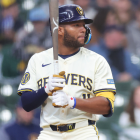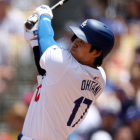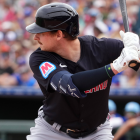
The Philadelphia Phillies took a 2-1 over the Houston Astros in the World Series on Tuesday night, winning a 7-0 blowout in Game 3.
The Phillies jumped ahead in the first inning in electric fashion, courtesy of a two-run home run from designated hitter Bryce Harper. Harper launched the first pitch he saw from Astros right-hander Lance McCullers Jr., an 85 mph breaking ball, into the right field stands, knocking in Kyle Schwarber, who had reached on a leadoff walk. According to Statcast's data, the ball had an exit velocity of 103.9 mph and traveled some 402 feet. Take a look at the beautiful home-run footage:
BRYCE BOMB
— Philadelphia Phillies (@Phillies) November 2, 2022
WORLD SERIES EDITION pic.twitter.com/OcRG3k404D
The Phillies offense wouldn't stop there, either. Alec Bohm led off the second with a home run of his own, the 1,000th in World Series history:
MR. BOHMBASTIC pic.twitter.com/P9dkb29TC7
— Philadelphia Phillies (@Phillies) November 2, 2022
Brandon Marsh then launched his own home run, making the Phillies the first team in World Series history to hit three in the first two innings.
MARSH MADNESS pic.twitter.com/RILvNNJh9D
— Philadelphia Phillies (@Phillies) November 2, 2022
The Phillies led 4-0 through two innings as a result. They would later add two more home runs and three more runs overall as part of a 7-0 victory.
It's worth noting that Harper's home run came in his first plate appearance at Citizens Bank Park since Game 5 of the National League Championship Series versus the San Diego Padres. Harper also hit a two-run shot in that at-bat, giving the Phillies a 4-3 lead over the Padres in the eighth inning. They would hold on to win and advance.
most XBH in single postseason, Phillies history:
— Sarah Langs (@SlangsOnSports) November 2, 2022
2022 Bryce Harper: 12 (14 games)
2009 Ryan Howard: 10 (15 games)
2008 Jayson Werth: 10 (14 games)
Harper's home run was the 12th extra-base hit of his postseason. He'd already set the Phillies franchise record when he notched his 11th, breaking a three-way tie with Ryan Howard and Jayson Werth. Harper also became the fourth Phillies player to ever swat six or more home runs in a single tournament, joining Werth, Chase Utley, and Lenny Dykstra, according to the research conducted by Baseball Reference.
The Phillies and Astros entered Tuesday deadlocked at 1-1 in the best-of-seven series. Historically, teams who have won Game 3 in that situation had then won the series in 68 of 98 cases. That works out to a 69.4 percent ratio, as well as a positive sign for the Phillies' chances of winning their first title since 2008.






















